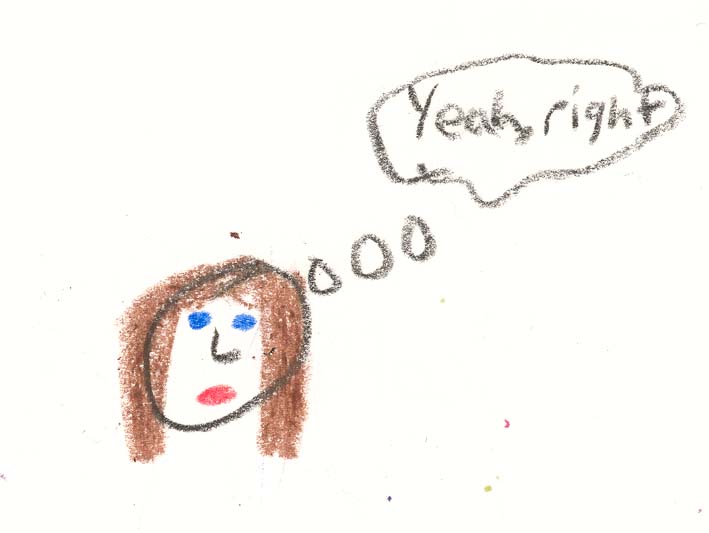scoffed

Word Wizard
Section 5, pgs 97-125
Word 1:
Write down the word deftly, the page 98, and the paragraph number 7.
Copy the sentence from the book in which the word appears:
"We have a vacation today," she said, and pulled the brush deftly through my hair.
Re-read the sentence in which the word appears. Think about the word, the sentence, and the story. Look up the word in the dictionary. Using the dictionary definition and everything you know about the word, write your definition of the word: to do something in a skillful and quick manner.
Write down an explanation telling how this word adds meaning to the story. What does this word have to do with the story? Think about the characters, plot, setting, theme, etc. This word adds meaning to the story in that it characterizes the way Peggy does things, and shows how skillful she is at the work she performs. This word helps the reader understand Peggy better.
Complete a daily vocabulary activity that goes with your word.
Word Network: What situations, things or words come to mind when you think of the word deftly?
skills, doing something carefully (like cutting with scissors)
Word 2:
Write down the word scoffed, the page 100, and the paragraph number 2.
Copy the sentence from the book in which the word appears:
"She should go to the library instead," I decided aloud, but Peggy scoffed at the thought.
Re-read the sentence in which the word appears. Think about the word, the sentence, and the story. Look up the word in the dictionary. Using the dictionary definition and everything you know about the word, write your definition of the word: to mock something or to think of an idea as ridiculous.
Write down an explanation telling how this word adds meaning to the story. What does this word have to do with the story? Think about the characters, plot, setting, theme, etc. This word adds meaning to the story in that it shows that Peggy thinks her sister Nell would rather have fun than go to the library, and that Nell would never go. It shows the hopelessness Peggy feels in regards to her sister's choices.
Make your word wizard card. Be sure to include in large print your word and the page and paragraph number. On the other side of the card you should draw a picture to represent your word, the word, and the definition of the word.
front of card: back of card:
| pg 100, paragraph 2
scoffed
|
scoffed: to mock something or to
think of an idea as ridiculous.
|
Complete a daily vocabulary activity that goes with your word.
Have you ever?: Name a time when you might have scoffed at an idea.
One time I scoffed at an idea was when my mother said my sister would have her homework done in time to get in bed by 10:00.
Word 3:
Write down the word awareness, the page 108, and the paragraph number middle paragraph.
Copy the sentence from the book in which the word appears:
There was an awareness to Jacob's being.
Re-read the sentence in which the word appears. Think about the word, the sentence, and the story. Look up the word in the dictionary. Using the dictionary definition and everything you know about the word, write your definition of the word: to recognize what's going on around you, to be conscious to situations.
Write down an explanation telling how this word adds meaning to the story. What does this word have to do with the story? Think about the characters, plot, setting, theme, etc. This word adds meaning because it shows the reader that even though Jacob can't communicate with words, he knows what's going on around him and he's able to think for himself. This is vitally important to understanding Jacob and the decisions that he makes in the story.
Complete a daily vocabulary activity that goes with your word.
Sentence Stems/Idea Completions:
You show awareness in a situation when you know what's going on around you and are able to make decisions about things based on what you know.
Word 4:
Write down the word elocution, the page 119, and the paragraph number 1.
Copy the sentence from the book in which the word appears:
But girls that age, I thought, should be in school, learning geography and elocution.
Re-read the sentence in which the word appears. Think about the word, the sentence, and the story. Look up the word in the dictionary. Using the dictionary definition and everything you know about the word, write your definition of the word: public speaking that uses hand gestures and voice inflections to add meaning to what's being said.
Write down an explanation telling how this word adds meaning to the story. What does this word have to do with the story? Think about the characters, plot, setting, theme, etc. This word adds meaning to the story in that it shows a subject from the 1900's that is generally downplayed in today's society. Most elementary age children are not taught a class in public speaking, but it is instead integrated into the curriculum through presentations and oral reports.
Make your word wizard card. Be sure to include in large print your word and the page and paragraph number. On the other side of the card you should draw a picture to represent your word, the word, and the definition of the word.
front of card: back of card:
| pg 119, paragraph 1
elocution
|
elocution: public speaking that
uses hand gestures and voice inflections to add meaning to what's being
said.
|
Complete a daily vocabulary activity that goes with your word.
Word Associations:
What word goes with speaking in public with emotion and hand gestures? elocution